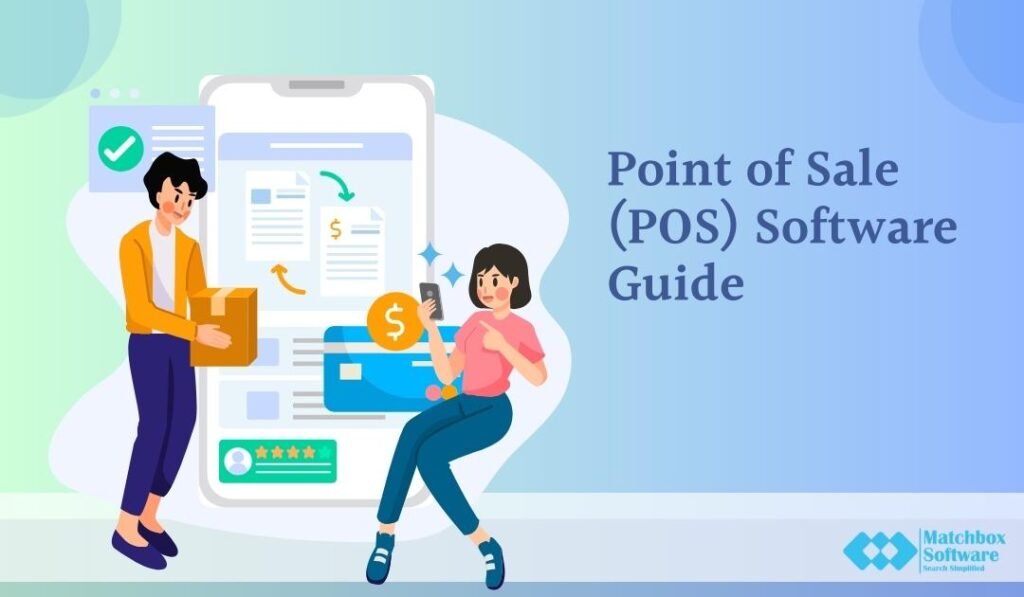Best POS Software
Elevate your brokerage business with our cutting-edge Point of Sale software. Boost efficiency, enhance customer experiences, and drive growth with our advanced, user-friendly solution. Discover more today!
Featured Softwares
List of 10 Best Point Of Sale (POS) Software
Have Questions? We can help!
Get personalized recommendations from our experts on call!
Top Trending Softwares

Uprow ERP
Uprow ERP is a comprehensive and user-friendly inventory management software designed to help businesses streamline their inventory processes and maximize profitability.
Table of Contents
Point of Sale (POS) Software: A Purchaser's Handbook

POS, short for point of sale, is an encompassing term that encompasses the advantages of merchandising while outlining the processes employed to streamline transactions. A Point of The sales software system comprises computer and hardware components, designed to document sales in real-time. It serves as a solution to a variety of operational and record-keeping challenges.
Point-of-sale systems, such as retail management systems, are meticulously crafted to record all sales transactions instantly. This ensures timely and accurate sales tracking and grants you the flexibility to manage inventory levels effectively. This becomes especially crucial when reconciling discrepancies between book figures and available stock in business operations.
Why Should Retailers Switch to POS Systems?
There are many reasons why retailers should switch to POS systems. Here are some of the most common:
• Improved efficiency and productivity: A sound POS system can help retailers streamline their operations and improve efficiency. For example, a POS system can automate inventory management, order processing, and customer checkout tasks. This can free up staff time to focus on providing better customer service.
• Increased accuracy: A POS system can help retailers reduce data entry and reporting errors. This is important for maintaining accurate inventory records and tracking sales performance.
• Improved customer service: A POS system can help retailers provide better customer service by offering loyalty programs, gift cards, and online ordering features. This can help retailers attract and retain customers.
• Enhanced security: A POS system can help retailers protect their data and prevent fraud. For example, a POS system can encrypt customer data and credit card information.
• Real-time data insights: A POS system can provide retailers real-time data insights into their operations. This data can be used to make informed decisions about inventory management, pricing, and marketing campaigns.
• Scalability: A good POS system should be scalable to grow with your business. This means you should be able to add new features and users as your business grows.
A POS system can help retailers improve their efficiency, accuracy, customer service, security, and data insights. This can lead to increased profits and better overall business performance.
When to Switch POS Systems?
Here are some signs that it’s time for a retailer to switch to a POS system:
• Your current system is outdated or no longer meets your needs.
• You’re experiencing problems with data accuracy or security.
• You’re looking for ways to improve customer service or efficiency.
• You’re planning to expand your business.
If you’re considering switching to a POS system, it’s essential to research and choose a system that’s right for your business. There are many different POS systems on the market, so comparing features, pricing, and support options is essential.
What are the advantages of POS software?
The benefits of POS software are substantial. Having the best POS software at your disposal can significantly enhance your business operations. It provides comprehensive solutions, from streamlined invoice generation to elevated customer satisfaction. Here are the key benefits of Point of Sale software:
1. Efficiency Boost: POS systems for small businesses offer fully automated operations, making your organization more efficient. Tasks are executed swiftly and accurately, leading to increased revenue generation.
2. Cost Savings: POS solutions reduce operating costs by eliminating the need to hire individual professionals for various functions. The software can handle a wide range of operations on its own.
3. Cloud-Based Control: The best POS software for small businesses integrates seamlessly with cloud technology, granting you control over your entire database. Quick access to data facilitates more efficient processes.
4. Customer Confidence: Implementing the best POS system helps build customer trust by providing user-friendly services, leading to higher customer satisfaction rates.
5. Inventory Management: Managing your stock becomes effortless with the assistance of the best POS system for small businesses. Detailed stock records are readily available for easy maintenance.
6. Streamlined Accounting: Cloud-based POS systems simplify accounting processes, eliminating the need for manual sales records prone to errors. Invoices can be generated accurately and effortlessly.
7. Employee Management: A Point of Sale system also aids in effective employee management. You can easily track your workforce without complex procedures.
8. Tax Record Keeping: The best POS system for small businesses allows you to record all tax-related activities, including GST filings, with automated calculations.
9. Sales Analytics: POS software provides detailed sales analytics, offering insights into your sales figures. This data can be invaluable for making informed decisions.
What are the Types of POS software?
Many different types of POS software are available, each with advantages and disadvantages. Here are some of the most common types:
• On-premise POS systems: These systems are installed on your hardware and software and require regular maintenance and updates. They offer more control and flexibility but can be more expensive to set up and maintain.
• Cloud-based POS systems: These systems are hosted on the cloud and accessed online. They are more affordable and accessible to set up than on-premise systems but may not offer as much control and flexibility.
• Mobile POS systems: These systems are designed for mobile devices such as tablets and smartphones. They are a good option for businesses that need to be able to process sales outside of a traditional retail setting.
• Self-service POS systems: These systems allow customers to checkout themselves, freeing up staff time. They are a good option for businesses with high customer traffic.
• Open-source POS systems: These systems are free to use and modify but may require technical expertise to set up and maintain.
The best type of POS system for your business will depend on your specific needs and requirements. An on-premise system may be a good option if you need a system with much control and flexibility. A cloud-based system may be a better choice if you are looking for an affordable and easy-to-use system.
Factors to Consider when choosing a POS system?
Here are some factors to consider when choosing a POS system:
• Your business size and type: The size and type of your business will affect the features and capabilities you need in a POS system. For example, a small restaurant will have different needs than a large retail store.
• Your budget: POS systems can range in price from a few hundred dollars to several thousand dollars. Setting a budget before you start shopping is essential so you don’t overspend.
• Your technical expertise: If you are not comfortable with technology, you may want to choose a POS system that is easy to use and maintain.
• Your future needs: Choosing a POS system that can grow with your business is essential. If you plan to expand, you must ensure your chosen system can support your needs.
The future of POS software is closely intertwined with the expansion of the retail industry, and fortunately, both online and brick-and-mortar retail sales are experiencing significant growth. Additionally, a substantial number of retailers are actively embracing POS terminals. You can refer to the latest market trends to gain further insights into the evolving landscape of POS system software.
Market Trends of POS software
Cash registers, optical scanners, and magnetic card readers are increasingly prevalent in retail. They offer enhanced compatibility with various terminals, display devices, and payment systems. Modern POS software is tailored for web-based functionality and optimized for mobile usage. The rise of mobile usage, electronic payments, and widespread digitization serves as critical indicators of this evolution. The substantial increase in smartphone users further fuels this shift. Retailers can now install highly efficient and secure point-of-sale systems, improving performance and more effective loyalty programs. The enhancement of IT infrastructure, system connectivity, and networking also plays a pivotal role.
Emerging trends in point-of-sale software encompass integrating cloud services and developing versatile mobile applications. Looking ahead to 2025, market predictions indicate a growth rate of 14.27%, with the market reaching a US $35 billion value. Furthermore, expect diverse solutions that combine hardware and software offerings from various vendors flooding the market.
Point of Sale (POS) software is a system that helps streamline sales and payment processes. You need it for your brokerage site to efficiently process transactions, manage inventory, and enhance customer experience.
Yes, our POS software is highly customizable. You can tailor it to match your brokerage’s specific requirements, including branding, product catalog, and reporting.
Absolutely, our POS software supports a wide range of payment methods, including credit cards, mobile wallets, and cash. It’s also compatible with various hardware devices for flexibility.
Our POS software tracks sales, inventory levels, and product performance. This data helps you make informed decisions and prevent stockouts.
Yes, our POS software offers remote access and management features. You can monitor sales, inventory, and employee performance from anywhere, ensuring operational control at all times.

